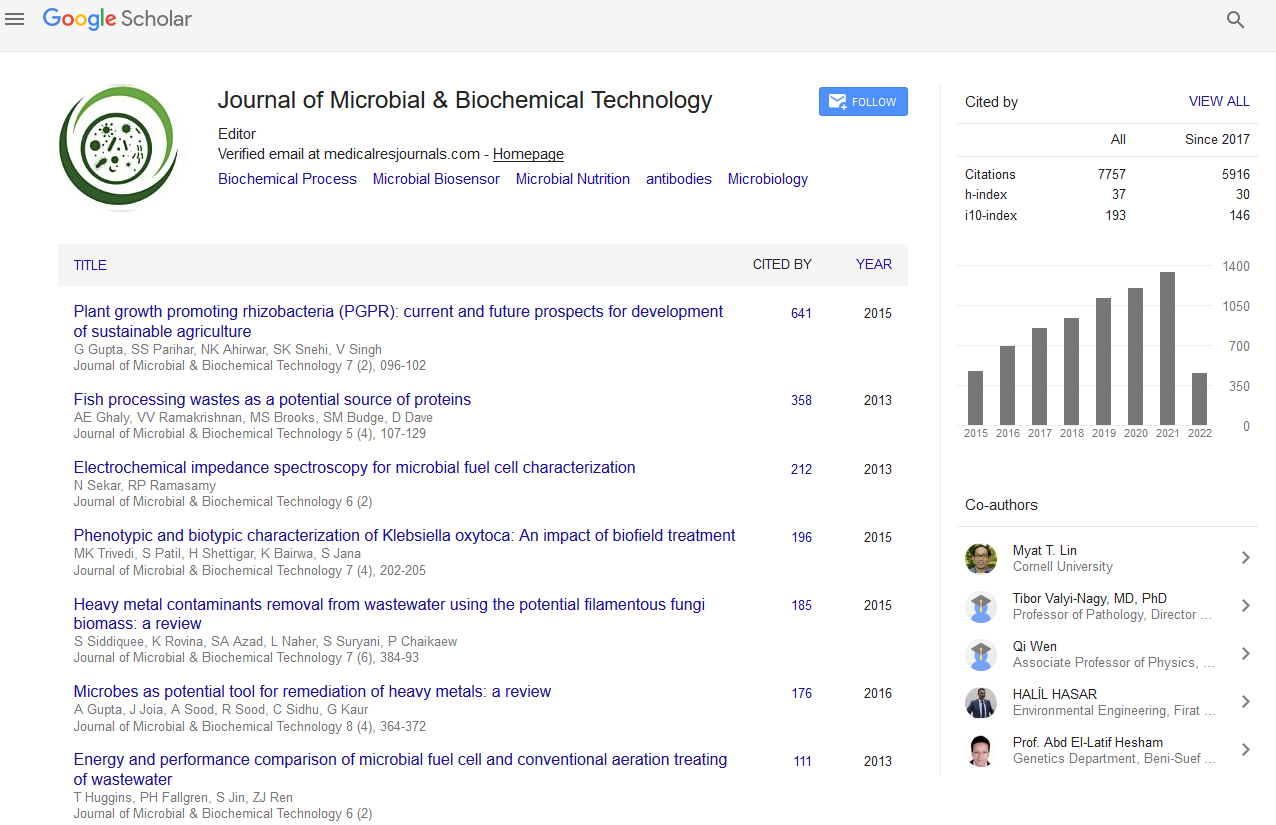PMC/PubMed Indexed Articles
Indexed In
- Academic Journals Database
- Genamics JournalSeek
- Academic Keys
- JournalTOCs
- China National Knowledge Infrastructure (CNKI)
- Scimago
- Access to Global Online Research in Agriculture (AGORA)
- Electronic Journals Library
- RefSeek
- Directory of Research Journal Indexing (DRJI)
- Hamdard University
- EBSCO A-Z
- OCLC- WorldCat
- SWB online catalog
- Virtual Library of Biology (vifabio)
- Publons
- MIAR
- University Grants Commission
- Geneva Foundation for Medical Education and Research
- Euro Pub
- Google Scholar
Useful Links
Share This Page
Journal Flyer

Open Access Journals
- Agri and Aquaculture
- Biochemistry
- Bioinformatics & Systems Biology
- Business & Management
- Chemistry
- Clinical Sciences
- Engineering
- Food & Nutrition
- General Science
- Genetics & Molecular Biology
- Immunology & Microbiology
- Medical Sciences
- Neuroscience & Psychology
- Nursing & Health Care
- Pharmaceutical Sciences
Molecular studies of ESòL producing bacteria isolated from clinical samples and the effects of local remedies
3rd World Congress and Expo on Applied Microbiology
November 07-09, 2016 Dubai, UAE
Ohalete C N, Obiajuru C I, Chikwendu C I, Nwabueze R N, Amadi E S and Okorondu S I
Imo State University, Nigeria
Federal University of Technology, Nigeria
Posters & Accepted Abstracts: J Microb Biochem Technol
Abstract:
Molecular studies of ESβL producing bacteria isolated from clinical samples and the effect of medicinal plants on ESβL-producing bacteria was studied from September 2013 to September 2015. A total of 480 bacterial isolates comprising of (250 from urine, 110 from wound swab & 120 from HVS & US) samples were used. The knowledge, attitude and practices (KAP) of health workers in Imo State towards multiple antibiotic resistant bacterial strains and extended spectrum beta-lactamase producing isolates was studied using structured questionnaires. A statistical technique known as Analysis of Variance (ANOVA) was used for the analysis of the data for the study via SPSS software package. The result showed that the respondents had good knowledge of multiple antibiotic resistant bacterial infections and the causes. The health workers varied in their attitudes towards management of multiple antibiotic resistant bacteria infections. While Medical Laboratory Scientists believed that MAR bacterial infection can be treated with prolonged antibiotic therapy, Medical Doctors were of the opinion that they can be treated with combined antibiotics therapy. Examination of clinical samples showed higher prevalence of multi-antibiotic resistant (MAR) Escherichia coli (50.3%) than Pseudomonas aeruginosa (43.3%) and Klebsiella species (36.6%). The prevalence of ESβL-producing strains was highest (67.6%) amongst Escherichia coli than Klebsiella species (64.7%) and Pseudomonas aeruginosa (57.7%). Gel electrophoresis of the PCR of the amplified genomic products showed that 36.7% were positive for TEM, 66.7 for SHV and 23.3% for CTX-M genes. Phenotypic screening of isolates for extended spectrum beta-lactamase production before curing showed high resistance to the β-lactam antimicrobials and the β-lactamases inhibitors of amoxicillin/clavulanic acid combination. However, analysis of post curing resistance showed a great reduction in rates of resistance against cefepime, ceftazidime and cefotaxime/clavulanic acid beta-lactamase inhibitors for Escherichia coli, Klebsiella species and Pseudomonas aeruginosa. Post curing results showed that half of the gene markers were born on the plasmids while the other half were born on the chromosomes. The plasmids and the beta-lactamase genes played important roles in the resistances identified. Studies on antibacterial effects of the medicinal plants showed that Ocimum gratismum and Xylopia aethiopica exhibited higher growth inhibitory effects on the bacterial isolates than Allium sativum, Vernonia amygdalina and Garcinia kola. The highest growth inhibitory effect (100%) was exhibited on Escherichia coli and Klebsiella species by Ocimum gratismum and on Escherichia coli by Xylopia aethiopica. The minimal inhibitory concentrations of the selected medicinal plant extracts on the test bacterial isolates were higher for MAR than for non resistant isolates. The study has shown that some medicinal plants commonly used in south Eastern Nigeria are capable of inhibiting growth of multiple antibiotic resistant and ESβL-producing bacteria. Policy makers in Nigeria and drug manufacturers should take advantage of this study and sponsor more studies on these plants with a view to developing novel antibiotics that may be able to treat MAR and ESβL-producing bacteria.
Biography :
Email: ohaletechinyere@gmail.com


